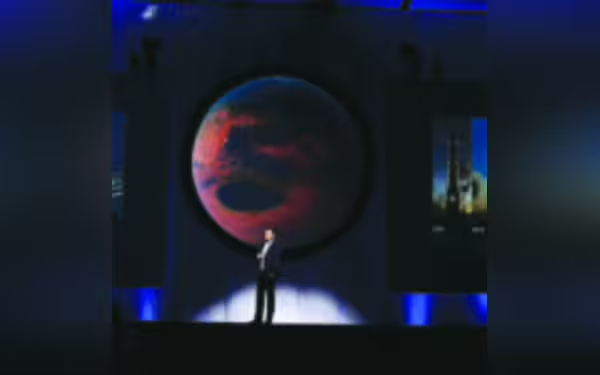Monday, December 23, 2024 12:14 AM
Elon Musk's Vision for Space Exploration and Colonization
- Musk aims to revolutionize space travel and colonize Mars.
- SpaceX's rocket achieved a flawless landing, impressing Donald Trump.
- Musk explores Faster-Than-Light travel through warp technology.
 Image Credits: pakistantoday
Image Credits: pakistantodayElon Musk's ambitious plans for space travel and colonization are reshaping humanity's future in the cosmos.
In recent years, the world has witnessed a remarkable surge in interest surrounding space exploration, largely fueled by the visionary ideas of entrepreneurs like Elon Musk. Musk, the CEO of SpaceX, has captured the imagination of many with his ambitious plans to revolutionize space travel and even colonize Mars. His innovative approach has not only garnered admiration but also sparked debates about the future of humanity in the cosmos.
During a recent interview, former U.S. President Donald Trump shared a captivating story about a SpaceX rocket that executed a flawless landing back on Earth. Instead of crashing into a barren landscape, the rocket performed a controlled descent, landing precisely on its launch pad. Trump’s astonishment at this feat led him to call Musk, who confirmed his involvement in the groundbreaking achievement. Trump remarked, "No country on the face of the Earth could do it, not even the USA, but you did it." This moment encapsulates the awe that Musk's work inspires, prompting many to delve deeper into his visionary ideas.
One of Musk's most intriguing concepts is the possibility of traveling at twice the speed of light. He suggests that this could be achieved not by traditional means of propulsion but by bending time and space. Musk explained that by "squeezing space," we could bring distant parts of the universe closer without actually moving through it. This idea is rooted in Einstein's General Theory of Relativity and involves creating a "warp bubble" that allows a spacecraft to traverse vast distances without breaking the laws of physics.
The concept of the Alcubierre Drive, proposed by physicist Miguel Alcubierre in 1994, supports Musk's vision. It suggests that by warping spacetime, a spacecraft could achieve effective Faster-Than-Light (FTL) travel. Musk is actively pursuing advanced propulsion technologies and has developed an AI supercomputer named "Colossus" to tackle the complex challenges of space travel. Located in Memphis, Tennessee, Colossus is equipped with cutting-edge technology and aims to fuel an AI model called "Grok," which Musk believes could help solve some of humanity's greatest mysteries.
In his discussions, Musk emphasizes the importance of understanding cosmology in simple terms. He acknowledges that while traveling faster than light is theoretically possible, it remains a significant challenge. He illustrates this by explaining how space itself can move faster than light, allowing for innovative travel concepts like the "warp drive." This revolutionary idea involves stretching space in front of a spaceship while compressing it behind, enabling travel to distant stars in an instant.
Despite facing skepticism and criticism early in his career, Musk's determination has led to remarkable achievements. SpaceX has conducted over 400 launches, including missions to transport astronauts to the International Space Station (ISS). As discussions about U.S. space policy evolve, there is a growing focus on commercial contracts with companies like SpaceX, which aligns with Musk's vision of sending humans to Mars.
Musk's ultimate goal is to establish a human presence on Mars, with plans to build up to 1,000 Starships annually for transportation between Earth and the red planet. While many scientists express concerns about the feasibility of sustaining life on Mars, Musk's relentless pursuit of innovation continues to challenge conventional thinking.
Elon Musk's ambitious dreams of space exploration and colonization are reshaping our understanding of what is possible. His ideas, rooted in scientific theory and propelled by cutting-edge technology, inspire a new generation to think beyond the stars. As we stand on the brink of a new era in space travel, it is essential to remain open to the possibilities that lie ahead, for the universe may hold secrets waiting to be uncovered.













